The Best Goat Milk Formula For Babies (2025 Guide)
This post may contain affiliate links. As an Amazon Associate, I earn from qualifying purchases. Please read my disclosure.As a certified nutritionist, health coach, and mom of two, I’ve spent over a decade researching infant nutrition and evaluating formulas. I know that choosing the right baby formula can feel overwhelming, especially when you’re considering goat milk options!
My comprehensive guide reflects my experience and research: it’s your evidence-based, parent-friendly resource to help you decide whether goat milk formula is right for your baby, what to look for and what to avoid, and how to choose which brand is best for your family.

So many of you have come across my best organic baby formula post, and I’m so glad that post has been helpful! One of the most common questions I get when it comes to baby formula is: What about goat milk formula? Is it better than cow’s milk formula? And which one is the best?
And it’s no surprise – goat milk formulas are gaining popularity for a reason. They can be gentler on tiny tummies, are naturally rich in nutrients, and contain A2 milk proteins that may be easier to digest than the A1 proteins found in cow’s milk.
But not all formulas are created equal. That’s why I evaluated every goat milk formula available today, from Europe to the U.S., and created my recommended list of the best goat milk formulas based on ingredient quality, safety standards, digestibility, and real-world results from thousands of parents.
In this guide, you’ll learn:
- When goat milk formula might be a better choice than cow’s milk
- What makes a high-quality goat milk formula (and what to avoid)
- A detailed comparison of the best formulas available today
- Which brands I’d personally trust for my own kids
📝 My Review Process & A Quick Note Before We Dive In
As a nutritionist and board-certified health coach, I base all my recommendations on current scientific research, expert consultations, and my personal experience feeding two formula-fed babies. I have thoroughly vetted every product in this guide, both for ingredient quality and real-world performance. This post has also been medically reviewed and fact checked by Katie Drakeford, MA, RD, CSP, LD, CLC (see my about page for more info about Katie).
This post is for informational purposes only and should not replace medical advice. Every baby is unique, so be sure to speak with your pediatrician before starting or switching formulas. My recommendations are not a substitute for professional medical advice, diagnosis, or treatment.
Some links in this post are affiliate links, which means I may earn a small commission if you purchase through them, at no extra cost to you. I only recommend products I would personally use with my own children. Thank you for supporting this blog and helping me continue to provide science-backed guidance for families like yours!
🐐 What Is Goat Milk Formula?
Goat milk formula is infant formula made from goat’s milk instead of cow’s milk. It’s carefully modified to match the nutritional profile required for babies, including protein, fat, carbs, vitamins, and minerals, so it’s safe for newborns when labeled as an infant formula.
While regular goat milk naturally contains more casein and less lactose than cow milk, it still needs to be processed and fortified to meet your baby’s needs. That’s why the formulas in this guide are different from regular goat milk, they’re specifically designed for infants. (Infants shouldn’t be given regular goat milk or cow’s milk until after 12 months of age).
There are also toddler versions of goat milk formula, meant for children 12 months and up. These can be great for weaning or supplementing a toddler’s diet with extra healthy fats and nutrients, especially for toddlers who are pickier eaters.
I recommend checking labels carefully, because not all goat milk formulas are approved for infants. If you’re unsure, talk to your pediatrician to find the right fit for your baby’s age and digestion
🍼 What Are The Benefits Of Goat Milk Formula?
As a nutritionist and mom, I’ve found that goat milk formula can be a great option, especially for babies who struggle with digesting cow’s milk formula. While it’s not hypoallergenic, goat milk offers several unique benefits that can make it a better choice.
Here’s why some families use it:
- Easier digestion: Goat milk contains mostly A2 casein proteins, which may be gentler on the gut than the A1 proteins found in cow’s milk. It also forms a softer curd in the stomach, which some babies tolerate better.
- Naturally rich in prebiotics: Goat milk is high in oligosaccharides, prebiotics that support healthy gut bacteria, similar to what’s found in breast milk.
- Fewer digestive symptoms: Thanks to smaller fat globules and more medium-chain fatty acids, goat milk is easier to break down, which may reduce gas, spit-up, or constipation in some babies.
- Anti-inflammatory properties: The oligosaccharides in goat milk may also support a stronger immune response and reduce inflammation in the gut.
- Potential for fewer skin reactions: Some studies have found lower rates of eczema in babies fed goat milk formula compared to those on cow’s milk-based formulas.
It’s important to note: These benefits can vary from baby to baby. Goat milk formula isn’t a guaranteed fix, but for the right child, it can make a noticeable difference in digestion and overall comfort For even more details, check out my list of the top 10 benefits of goat milk formula for babies.
🥛 How Is Goat Milk Formula Different From Cow’s Milk Formula?
If your baby isn’t tolerating cow’s milk formula well, goat milk might offer a gentler alternative, but the two types of formula are actually quite similar in overall nutrition. The key differences come down to digestibility and how your baby’s body handles the proteins, fats, and sugars in each milk type.
Here’s how goat milk formula compares:
- A2 vs. A1 Proteins: Goat milk naturally contains more A2 beta-casein, a protein that’s often easier to digest and less likely to cause inflammation than the A1 beta-casein found in most cow’s milk.
- Fat Composition: Goat milk has smaller fat globules and more medium-chain fatty acids, both of which are easier for babies to break down and absorb. This also results in softer curd formation in the stomach, which may reduce discomfort, gas, or constipation in some babies.
- Lactose Content: Goat milk contains slightly less lactose than cow’s milk, which can be helpful for babies with mild lactose sensitivity (though not appropriate for babies with true lactose intolerance).
- Natural Nutrients: Goat milk is naturally rich in vitamin A, calcium, and essential fatty acids, though both goat and cow milk formulas are fortified to match ideal nutrition for infants, regardless of the milk source, so this isn’t a major difference.
- Taste & Texture: Goat milk formula tends to be creamier and mildly sweeter. Some babies love the taste, others may not!
One thing to keep in mind: While goat milk can be easier to digest for many babies, it’s not hypoallergenic and is still considered a dairy formula. Always check with your pediatrician before making a switch, especially if your baby has a diagnosed milk allergy or persistent digestive issues.
For more details on what the pros & cons are of goat milk vs. cow milk formula, check out my guide to goat milk formula vs. cow’s milk formula.
🤔 Is Goat Milk Formula Better For Babies?
In my experience as both a nutritionist and a mom, the short answer is: it depends. Goat milk formula can be a fantastic option for some babies, but it’s not automatically better than cow’s milk formula for everyone.
Here’s what I tell parents when they’re deciding between the two:
- Goat milk formula may be easier to digest for some babies due to its A2 proteins, smaller fat globules, and softer curd formation in the stomach.
- It can be a great alternative if your baby struggles with gas, constipation, or mild digestive discomfort on cow’s milk formula.
- It’s not hypoallergenic. Goat milk still contains dairy proteins and lactose. If your baby has a diagnosed cow’s milk protein allergy (CMPA) or true lactose intolerance, goat milk formula likely isn’t the right fit.
Some babies thrive on goat milk formula from day one. Others may not love the taste or may get constipated on it. And for babies who do well on cow’s milk formula, there’s usually no need to switch.
👉 Bottom line: There’s no universal “best” formula. It comes down to your baby’s individual needs and your pediatrician’s guidance. If cow’s milk formula isn’t working and you want a gentle, nutrient-rich alternative, goat milk formula might be worth trying.
⭐️ Ideal Goat’s Milk Formula Ingredients
As a mom who formula fed my own two kids, I know how overwhelming formula labels can be. But once you know what to look for, and what to avoid, it gets much easier to make a confident choice. Here are the ingredients I prioritize when evaluating goat milk baby formulas:
✅ Organic or Non-GMO Sourcing: Formulas made in the EU or New Zealand typically have stricter organic standards and better animal welfare practices. Holle, Jovie, and HiPP are excellent examples.
✅ Lactose as the Primary Carbohydrate: The main carbohydrate in breast milk is lactose, so I prioritize formulas that also only use lactose. It’s best to avoid added sugars like glucose syrup, corn syrup solids, or maltodextrin.
✅ Balanced Whey-to-Casein Ratio (Ideally 60:40): Goat milk naturally has more casein (about a 20:80 whey:casein ratio), which can be harder to digest. Brands that add extra whey (like Kendamil) make their formula easier on little tummies. Another alternative is for formula brands to add healthy fats and prebiotics, as Jovie does, to aid in smooth digestion despite the whey-to-casein ratio.
✅ Omega-3 & 6 Fatty Acids (DHA & ARA): These support brain and eye development. I look for cold-extracted or non-hexane-sourced DHA wherever possible.
✅ Prebiotics and/or Probiotics: Prebiotics help feed good gut bacteria. Ideally, probiotics are added as well, but you can also supplement with probiotics for formulas that don’t contain it, whereas it is much harder to supplement with prebiotics for infants.
✅ No Highly Processed Additives: I avoid formulas with carrageenan, synthetic preservatives, hexane-extracted ingredients, and soy protein isolate.
✅ Smooth Texture and Easy Mixing: Creamy, lump-free formulas are more palatable and easier to digest.
👉 Note: Some ingredients like palm oil or soy lecithin aren’t ideal but aren’t necessarily deal-breakers. If your formula meets most of the above and works well for your baby, that’s what matters most.
🚫 Ingredients To Avoid In Goat Milk Formula
Over the years, I’ve reviewed dozens of formulas and these are the ingredients I consistently recommend avoiding:
❌ Synthetic DHA & ARA: While DHA and ARA are important nutrients found in breast milk, many formulas use versions extracted with hexane, a chemical solvent. Look for formulas that use non-hexane or water-extracted sources instead.
❌ Genetically Modified Organisms (GMOs): Always look for formulas labeled non-GMO or certified organic, which ensures they’re free from genetically modified ingredients and pesticide residues like glyphosate.
❌ Carrageenan: This thickening agent is banned in Europe for use in infant formula due to its link to gut inflammation (source). Unfortunately, it’s still allowed in the U.S., so double-check labels if you’re buying domestic brands.
❌ Soy Protein Isolate: While soy oil is sometimes necessary, soy protein is more highly processed and may interfere with hormone development in infants when consumed regularly (source).
❌ Palm Oil: Found in many U.S. formulas, palm oil can cause digestive issues and may reduce calcium and fat absorption. While hard to avoid entirely, I consider it a yellow flag, better to skip when possible
🏆 Quick Picks: Best Goat Milk Formulas (2025)
If you’re short on time, here are my top recommendations at a glance. Further down in this guide, you will find a detailed list of the best goat milk formulas and why I love each of these options.
- Best Overall: Jovie Goat Milk Formula. Organic, made with whole goat milk, and free from palm oil and soy. Includes DHA (from fish oil) Clean, creamy, and gentle.
- Best Budget-Friendly Option: Aussie Bubs Goat Milk Formula. Non-GMO, clean-label certified, and comes in either 0-12 month option at Target, or a stage 1/2 option online.
- Best Toddler Formula: Kabrita USA Goat Milk Toddler Formula. Nutrient-dense, easy to digest, and widely available in the U.S.
- Best Whole Milk Base: Kendamil Goat and Nanny Care. A2 protein, contains DHA, no palm oil or fish oil, and mimics breast milk’s whey:casein ratio.
- Best European Option: HiPP Dutch Goat Milk Formula. Organic, and known for gentle digestion.
- Best With Prebiotics: Kabrita Infant Formula. Includes GOS prebiotics, DHA, ARA, and a whey-to-casein ratio similar to breast milk.
- Best Established Brand: Holle Goat Milk Formula (German) and Holle Goat Formula (Dutch). Organic and Demeter-certified, formula makers for 85 years, slightly lower in digestibility.
- Best Vegetarian Formula: Kendamil Goat. No fish oil, and uses plant-based DHA and ARA.
- Best Non-European Option: Kabrita USA or Aussie Bubs. U.S.-friendly formulations with high safety standards and clean sourcing.
I chose these formulas based on: over 100 hours of research, speaking with thousands of parents on what has worked for their children, personal experience with my own two kids, reviewing the ingredients of every goat formula brand on the market, speaking with doctors and pediatricians, and reviewing countless articles and peer-reviewed studies.
🔍 The 10 Best Goat Milk Formulas (Details)
My list below dives into the 10 best goat milk formulas on the market today and the pros and cons of each! Just click on the product name to see my preferred reliable formula distributor for that particular brand.
❓Goat Milk Formula FAQs
No, regular goat milk is not safe for babies under 12 months. Goat milk on its own doesn’t have the right balance of nutrients, so it must be heavily modified to become infant formula. Goat milk formula is carefully designed to meet babies’ nutritional needs, just like cow’s milk formula. Always consult your pediatrician before offering any new formula.
Yes! Goat milk formula that meets FDA or European Commission standards is considered safe for infants. These formulas go through rigorous testing to ensure they contain the correct balance of protein, fat, vitamins, and minerals for your baby’s growth and development.
Some babies with mild dairy sensitivity do better on goat milk formula because it contains A2 milk proteins and is easier to digest. But for babies with true CMPA, goat milk would likely still trigger a reaction. Most babies with CMPA need a true hypoallergenic formula, and since goat milk formula is not considered hypoallergenic, it’s important to talk to your pediatrician before trying it if your baby is diagnosed with CMPA.
Yes, you most definitely can purchase goat milk formula in the United States. Kendamil Goat Milk Formula and Bubs Stage 1 Goat Milk Formula are both for sale at Target stores. Others, like Jovie or Holle, can be imported from Europe through reputable retailers. Availability has expanded significantly since the 2022 formula shortage.
Some are, some aren’t. The FDA doesn’t “approve” infant formulas, but they do regulate infant formulas. Some brands like Kabrita USA, Aussie Bubs, and Kendamil are FDA-regulated under import programs like Operation Fly Formula, and others are regulated either by the European Commission (for European baby formulas) or the equivalent regulatory body in the country the formula is produced in.
Goat milk has some similarities to breast milk, including prebiotic content and A2 proteins, which can support easier digestion. But it still has a different fat and protein composition and must be fortified to meet infant needs. No formula is an exact match for breast milk, but many goat milk options are thoughtfully designed to be as close as possible with a whey:casein ratio that matches mature breastmilk.
💡More Helpful Formula Guides!
- Best Vegan Baby Formula
- Benefits Of Goat Milk Formula
- Best Baby Formula For Colic
- How To Transition From Breastmilk To Formula
- Best A2 Baby Formula
- Best Toddler Formula
- Kabrita Goat Milk Formula Review
- Jovie Goat Milk Formula Review
💭 Final Thoughts
I hope this guide helped make goat milk formula feel a little less overwhelming and a lot more approachable. As a nutritionist, mom of two, and someone who’s spent countless hours researching formulas, I truly believe goat milk formula can be a wonderful option, especially for babies with mild sensitivities or digestion issues.
Every baby is different, and there’s no one-size-fits-all answer. What matters most is that you feel informed and empowered in your decision. Whether you choose Jovie, Kendamil Goat, Kabrita, or another trusted brand on this list, you’re doing the best you can for your little one, and that’s what counts most.
If you’re still unsure where to start, Jovie is my top recommendation for its clean ingredients, whole A2 goat milk base, and overall nutritional profile. But any formula you choose from this list is one I’d feel confident feeding my own kids.
If you have any questions or want to share your experience with goat milk formula, feel free to drop a comment below, I’d love to hear from you and I respond to every comment and question I get!
Love this helpful guide? Feel free to leave any comments or questions in the comment section further down the page!
You can also FOLLOW ME on FACEBOOK, INSTAGRAM, and PINTEREST to see more delicious, healthy, family-friendly food, and if you have any questions, I’m here to help!



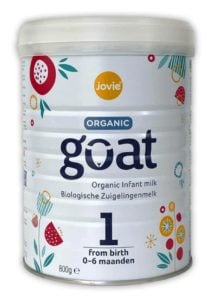
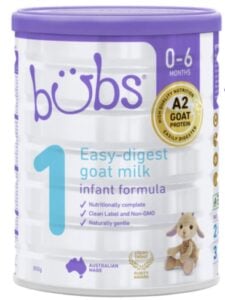
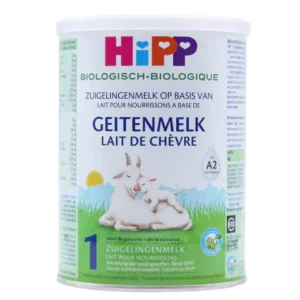
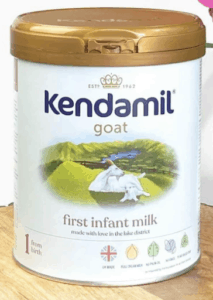
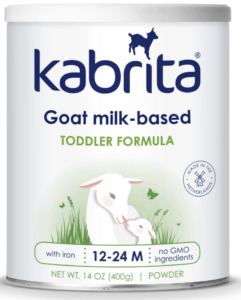
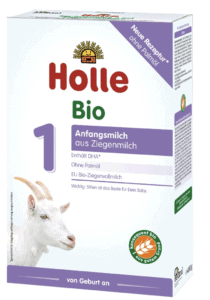
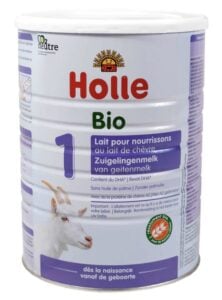
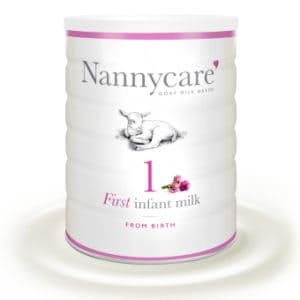
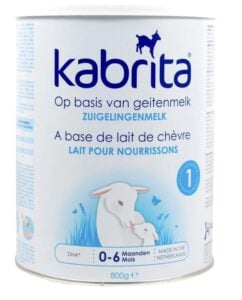
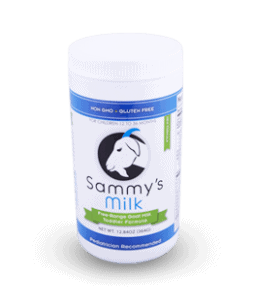


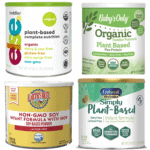




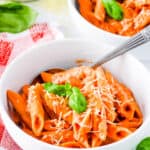

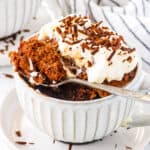


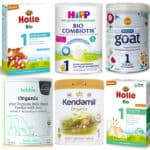



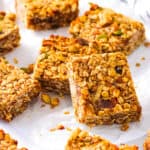




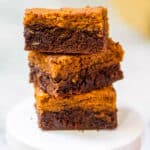

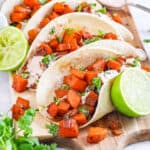
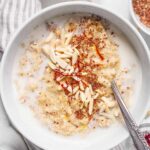
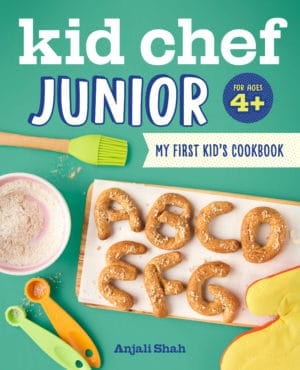


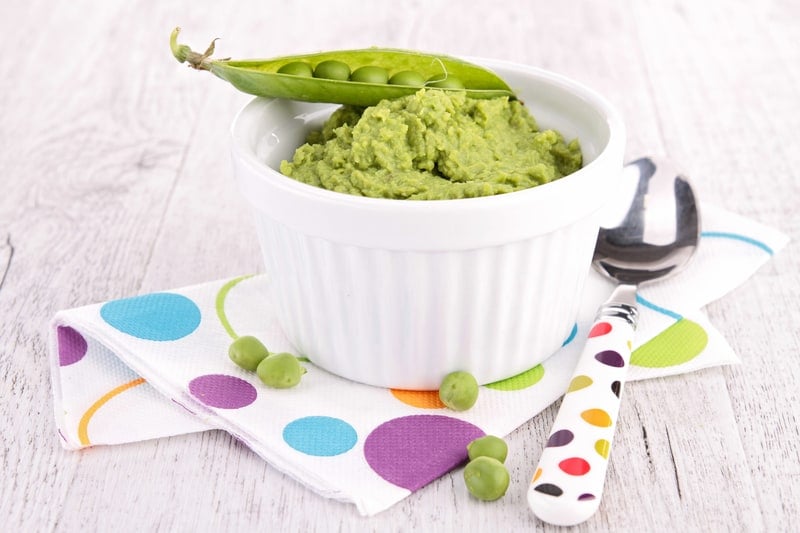
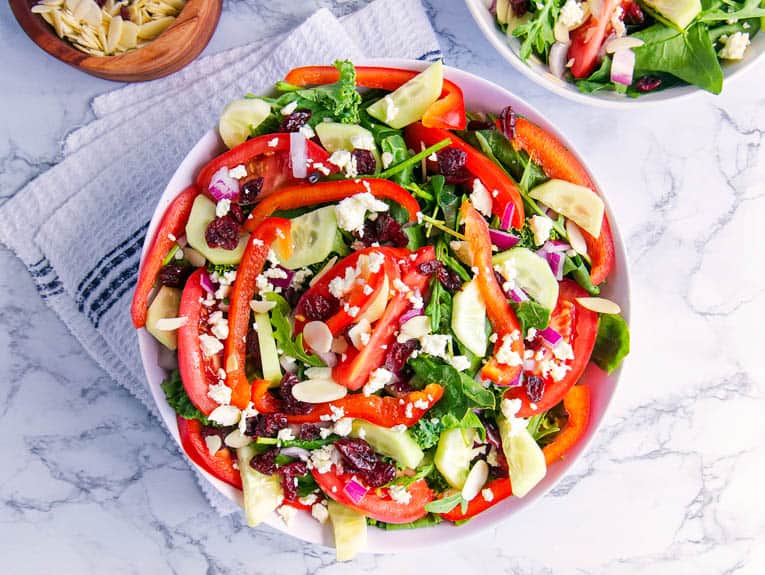


Hi Anjali- this is great info! Thank you! My baby has had poop problems 🙂 since birth. She went once a week until about six months. Now- she goes every other day a little bit but it’s very hard. We tried Hipp Dutch and Hipp UK and Hipp HA but no real change. Would you recommend Kabrita for her?
Hi Kristen! I’m so glad this post was helpful for you! Regarding your baby — if she’s over 6 months old and eating solids, I’d actually recommend adding in a serving of these baby prunes into her diet every day, along with a good amount of water (some at every meal). That might actually solve her constipation issues! If she didn’t really see a change between HiPP Dutch, UK and HA she may not see much of a change with only switching to Kabrita – without other dietary changes – but it’s worth a shot! If your pediatrician is ok with you switching to Kabrita, you can go ahead and do that but I’d still add in the baby prunes + water on a daily basis. Hope that helps, let me know if you have any other questions!
I just have a question. You said to not confuse Kabrita USA with Kabrita.com but I’m confused lol. What is the difference? And how come Kabrita UAS only sells toddler formula when Kabrita makes different stages?
Hi Danielle! Kabrita.com is the European version of Kabrita which has stages but the ingredients are worse – they add glucose syrup solids to their formula and other synthetic ingredients. KabritaUSA is the US version of Kabrita, which has much cleaner ingredients and no glucose syrup added! KabritaUSA is technically a toddler formula, but their formula meets the standard nutrition requirements for infant formula. So as long as your pediatrician is ok with you using KabritaUSA for your baby it’s a perfectly good option!
Hi Anjali! I used the Mt Capra recipe with my first two as they both we end themselves at 4-5 months. I love the Mt Capra goat milk/recipe however when traveling it can be difficult as you have to take it pre-made, keep it cold, then heat it enough for the coconut oil the liquify.
I just had our 3rd & in the event the he weens early too, would you say the Capra & Kabrita compare in quality?
Hi! Thanks so much for reaching out! The Mt Capra recipe is great but I totally agree with you about the traveling component — taking it on the go is definitely not easy. I’d say Kabrita is probably the most comparable to Mt Capra since it’s the cleanest goat milk formula out there! The ingredients are still different than Mt Capra but nutritionally it is complete for infants. I hope that helps, let me know if you have any other questions!
Are you not concerned that the soybean oil, palm kernel oil, and sunflower oil are inflammatory and not good for the baby?
Hi Bill! The Mt Capra recipe does not include palm kernel oil or soybean oil. They do include sunflower oil, but it is High Oleic Sunflower oil which delivers monounsaturated fats and vitamin E, but can be replaced with Extra Virgin Olive Oil as well.
Thank you so much for your website. It was so wonderful to read all your questions and answers. I feel so much better now that I read them.
Thank you so much Marjorie! I’m so glad it was helpful for you!
Hi there! I have a 5 mo old I’d like to start on Kabrita. Will she get enough folic acid? If not do you have a suggestion to supplement with?
Hi Britney! Kabrita has the same amount of folic acid as all the standard US formulas (16mcg for 100 calories). So you should be fine! I would double check with your pediatrician to make sure they don’t have any concerns as well — but the amount of folic acid looks identical to me!
Hi Brittany, how are you using Kabrita if it’s only intended for 12-24month olds?
Curious mom with 5 month old baby girl.
Hi Stefanie! Kabrita meets the nutritional requirements for infant formula (see their chart here). So as long as your pediatrician gives you the ok, you can give Kabrita to your infant!
Hello, I have a grandchild that is 3 months old and is having many issues with all formulas that we have tried. Does Kabrita make a 0-6 month formula? I see on my research that it is found in Europe. Thank you
Hi Felix! The Kabrita infant formula (from Europe) actually does not have good ingredients and I wouldn’t recommend it. Kabrita USA, even though it’s marketed for toddlers, meets the nutritional requirements for an infant formula. If your pediatrician is comfortable with it, you can certainly use it for a baby younger than 12 months. Hope that helps!
The Kabrita USA offers formula for 12 months+ I did not see another option. Do you know if they carry formula for a 4 month old ?
Hi Myranda! Kabrita USA is marketed as a toddler formula but it meets the FDA nutritional requirements for infant formula. So I would just double check with your pediatrician that they are comfortable with you using it, and then you should be fine giving it to your baby!
Hello again!
I recently changed to Kabrita which my baby has done well with, she’s 3 months today! My pediatrician wasn’t too happy with it though, more so because he had never heard of Kabrita & said that if she didn’t have an intolerance to cow milk there was no reason why I should have her on goat. That she needed the cow formula to benefit her brain and so on. (I also live in a city where doctors are not very progressive & are “old school” who just want to prescribe similac & enfamil, which I don’t want to give my child. Any suggestions!? Thanks so much
Hi Denay! I think if your baby is doing well on Kabrita there is no need to change formulas! I agree with your doctor that you don’t have to do goat’s milk formula if your baby does well on cow’s milk, but Kabrita is nutritionally complete for infants according to their website. I think if you really want to get your pediatrician on the same page as you, I’d print out the nutritional label for Kabrita and the nutritional label for Similac and show it to them (they’ll see that the nutrition labels are quite similar, even though the actual ingredients in Kabrita are totally different and far superior to Similac!) Hope that helps!
What are your thoughts on Earth Fare’s goat milk formula?
Hi Valeri! I couldn’t find any info on Earth Fare – are you sure that’s the brand of the formula you’re looking for? If so, feel free to email me a photo of the label/ingredients/nutrition (pickyeats@gmail.com) and I can take a look!
Do you know why Kabrita USA is labeled as a toddler formula, but meets FDA nutrition guidelines for infant formula? Why not just label it as infant formula?
Thanks for you help!
Hi Michelle! Basically, there are additional FDA regulations for infant formulas that Kabrita USA hasn’t gone through yet (I believe they are doing this in 2019) and that’s why for now, it has to be labeled as a toddler formula even though it meets the nutritional guidelines for infant formulas. I know lots of moms who have used Kabrita for their infants and their babies have done well on it, so if your pediatrician is comfortable with you using Kabrita for your baby I don’t see any reason why it should be an issue! Hope that helps!
I read in another blog that Kabrita has too much protein for infants less than 12 months. Do you have an opinion on this?
Hi Kelly! Kabrita has 2.7g protein per 100 calories, vs 2.1g protein (on average) for most infant baby formulas. Babies need around 0.69 grams of protein per pound of body weight per day from 0 to 6 months and 0.55 grams per pound of body weight from 7 to 12 months. So depending on your baby’s weight and how much formula they drink daily, Kabrita may have just enough or too much protein for your baby! I would ask your pediatrician if the difference between 2.7g and 2.1g per 100 calories is something they feel comfortable with depending on the needs of your little one. Hope that helps!
Sammy’s is the only one that doesn’t have folic acid. I want to avoid that because baby has mthfr. But the recall makes me nervous. What do you think of my capra recipe and making it myself?
Hi Crystal! That makes sense – that’s why Sammy’s is ranked lower on my list as well! Regarding the capra recipe, as far as I know it looks good and the moms I know who have tried it have had success with it. If you’re thinking of going down that path I’d talk to your pediatrician to make sure they’re comfortable with it too!
Which vitamin powder will you use with Mt Capra for folate? The one they provide has folic acid if I’m correct? My baby has mother too, and I’m in the same dilemma.
Hi Brooke! Did you mean MTHFR? (not mother?) If so, I’m actually not aware of an infant vitamin that has methylated Bs — all of the vitamins for kids with methylated Bs are for toddlers and older. Your pediatrician might be able to give you a prescription for methylated B vitamins that are suitable for infants. And if you do find an infant vitamin with methylated Bs let me know and I’ll add it to my vitamins guide! Thanks!
Hi! Any thoughts on Mt. Capra’s recipe and goat milk products?
Hi Courtney! I have never used Mt. Capra’s recipe personally, but I know other moms who have and have had success with it. If you are thinking of trying their recipe I’d just check with your pediatrician to make sure they’re comfortable with you following that recipe for homemade formula for your little one. Mt. Capra’s goat milk products have super clean ingredients and it looks like they are non-GMO and organic (the goats either graze on grass or are fed organic hay/feed). Hope that helps!
Hello!
Thanks for the great info! I see that Kabrita seems to only have a 12-24 month formula. is that for labeling purposes, but its actually ok for infants? thanks!
Hi Heather! So yes it is for labeling purposes, and I know moms who use Kabrita for their infants with no issues. That said, you should definitely check with your pediatrician before using this formula for your little one just to make sure they are on board with it! Thanks!
Did you know that organic start has Kabrita goats milk for infants, but the only downside is that they are charging $69 a can. Is this the same company that makes Kabrita toddlers formula and is it as good?
Hi Rebekah! Actually the one on Organic Start isn’t the same one that I recommend. The one on Organic Start is Kabrita from Europe, and the one I recommend is actually Kabrita USA. Kabrita is the one brand where the US version is way healthier than the UK version! The UK version has glucose syrup solids added among other things, but the US version has really clean ingredients and it’s way cheaper! So buy the US version, and don’t buy the one on Organic Start. Hope that helps, let me know if you have any other questions!
But this one is toddler formula for 12-24 month.
My baby is 5-1/2 months old.
How is it ok to use the toddler formula? Just need to know before I try one. I just got the Holle brand stage 1. It does not show taurine in the ingredients. It also has decent mg of whey protein. Help
Hi Shari! Regarding Kabrita – you can use it for infants. This is what Kabrita says about the toddler formula designation: “Kabrita Goat Milk Toddler Formula meets the FDA nutrient requirements for infant formula, but we do not recommend it as the only source of nutrition for either infants or toddlers. Our formula is naturally easy to digest and designed to maintain the natural comfort of little ones during feeding transitions, such as weaning and supplementing. We encourage you to speak with a healthcare provider to discuss your child’s nutritional requirements and the available feeding options.” I know lots of moms who have given it to their infants with no issues, but you should just check with your pediatrician before starting any new formula just to make sure they are on board. Holle Stage 1 does not have taurine – you are right. In my post I didn’t say it had taurine, I ranked it third because it has maltodextrin, palm oil, and while it does have whey, the whey-to-casein ratio is not ideal for infants and can be constipating for some babies. I hope that helps, let me know if you have any other questions!
Do people use the goat milk formula even if their baby doesn’t have a cow’s milk sensitivity? I am sensitive to cow’s milk and so is my older son. I’m looking for something to supplement with as I can’t keep up my milk supply with working. I just can’t pump the same amount of ounces that he’s eating at daycare. Your post mentioned this is the closest thing to breastmilk so it caught my attention.
Hi Heather! Yes you can use a goat milk formula even if your baby doesn’t have a cow’s milk sensitivity! Goat milk formula is a replacement for cow’s milk formula – it has all of the same nutrients you’d get but just uses goat milk as a base instead of cow’s milk. So I think as long as your pediatrician is ok with it, you can use this formula for your little one!
Hello, does Kabrita meet the nutritional requirements for a 4 month old? It is advertised as a toddler formula.
Hi Jennifer! I do know parents of infants who use Kabrita and have had no issues with it. Kabrita is similar to Baby’s Only in that it’s marketed as a toddler formula but can be used for infants. That said, I would definitely ask your pediatrician before starting your baby on it – just to make sure they are comfortable with it as well! Hope that helps, let me know if you have any other questions!